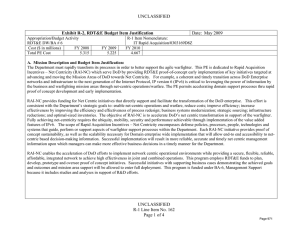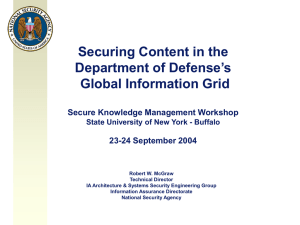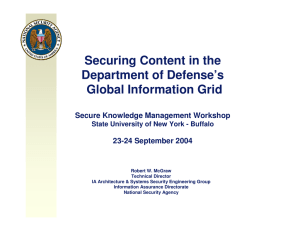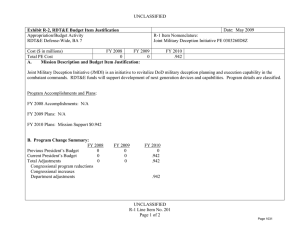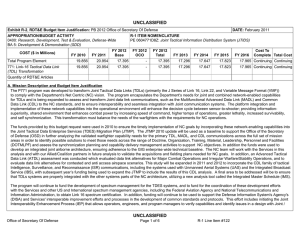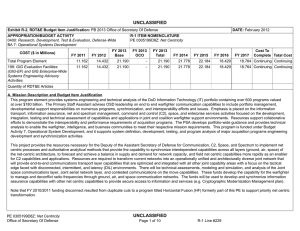UNCLASSIFIED
advertisement
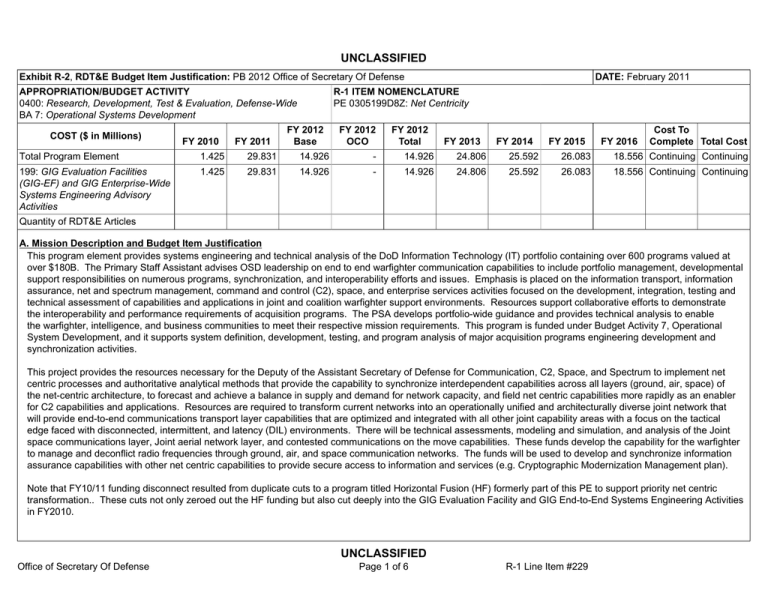
UNCLASSIFIED Exhibit R-2, RDT&E Budget Item Justification: PB 2012 Office of Secretary Of Defense APPROPRIATION/BUDGET ACTIVITY 0400: Research, Development, Test & Evaluation, Defense-Wide BA 7: Operational Systems Development COST ($ in Millions) FY 2010 FY 2011 DATE: February 2011 R-1 ITEM NOMENCLATURE PE 0305199D8Z: Net Centricity FY 2012 Base FY 2012 OCO FY 2012 Total FY 2013 FY 2014 FY 2015 FY 2016 Cost To Complete Total Cost Total Program Element 1.425 29.831 14.926 - 14.926 24.806 25.592 26.083 18.556 Continuing Continuing 199: GIG Evaluation Facilities (GIG-EF) and GIG Enterprise-Wide Systems Engineering Advisory Activities 1.425 29.831 14.926 - 14.926 24.806 25.592 26.083 18.556 Continuing Continuing Quantity of RDT&E Articles A. Mission Description and Budget Item Justification This program element provides systems engineering and technical analysis of the DoD Information Technology (IT) portfolio containing over 600 programs valued at over $180B. The Primary Staff Assistant advises OSD leadership on end to end warfighter communication capabilities to include portfolio management, developmental support responsibilities on numerous programs, synchronization, and interoperability efforts and issues. Emphasis is placed on the information transport, information assurance, net and spectrum management, command and control (C2), space, and enterprise services activities focused on the development, integration, testing and technical assessment of capabilities and applications in joint and coalition warfighter support environments. Resources support collaborative efforts to demonstrate the interoperability and performance requirements of acquisition programs. The PSA develops portfolio-wide guidance and provides technical analysis to enable the warfighter, intelligence, and business communities to meet their respective mission requirements. This program is funded under Budget Activity 7, Operational System Development, and it supports system definition, development, testing, and program analysis of major acquisition programs engineering development and synchronization activities. This project provides the resources necessary for the Deputy of the Assistant Secretary of Defense for Communication, C2, Space, and Spectrum to implement net centric processes and authoritative analytical methods that provide the capability to synchronize interdependent capabilities across all layers (ground, air, space) of the net-centric architecture, to forecast and achieve a balance in supply and demand for network capacity, and field net centric capabilities more rapidly as an enabler for C2 capabilities and applications. Resources are required to transform current networks into an operationally unified and architecturally diverse joint network that will provide end-to-end communications transport layer capabilities that are optimized and integrated with all other joint capability areas with a focus on the tactical edge faced with disconnected, intermittent, and latency (DIL) environments. There will be technical assessments, modeling and simulation, and analysis of the Joint space communications layer, Joint aerial network layer, and contested communications on the move capabilities. These funds develop the capability for the warfighter to manage and deconflict radio frequencies through ground, air, and space communication networks. The funds will be used to develop and synchronize information assurance capabilities with other net centric capabilities to provide secure access to information and services (e.g. Cryptographic Modernization Management plan). Note that FY10/11 funding disconnect resulted from duplicate cuts to a program titled Horizontal Fusion (HF) formerly part of this PE to support priority net centric transformation.. These cuts not only zeroed out the HF funding but also cut deeply into the GIG Evaluation Facility and GIG End-to-End Systems Engineering Activities in FY2010. Office of Secretary Of Defense UNCLASSIFIED Page 1 of 6 R-1 Line Item #229 UNCLASSIFIED Exhibit R-2, RDT&E Budget Item Justification: PB 2012 Office of Secretary Of Defense APPROPRIATION/BUDGET ACTIVITY 0400: Research, Development, Test & Evaluation, Defense-Wide BA 7: Operational Systems Development B. Program Change Summary ($ in Millions) Previous President's Budget Current President's Budget Total Adjustments • Congressional General Reductions • Congressional Directed Reductions • Congressional Rescissions • Congressional Adds • Congressional Directed Transfers • Reprogrammings • SBIR/STTR Transfer • Program Adjustment • OSD Studies Contracts Efficiency • DoD Service Support Contracts Efficiency • Economic Assumptions • NII Contractor Efficiency • Net Centricity Efficiency DATE: February 2011 R-1 ITEM NOMENCLATURE PE 0305199D8Z: Net Centricity FY 2010 FY 2011 FY 2012 Base FY 2012 OCO FY 2012 Total 1.467 1.425 -0.042 29.831 29.831 - - - - - - - - - - - - - - 30.434 14.926 -15.508 - - - 30.434 14.926 -15.508 - -2.407 -1.581 -0.018 -1.502 -10.000 - - - - - - - -2.407 -1.581 -0.018 -1.502 -10.000 - - - -0.042 - - - - - Change Summary Explanation FY 2010: Program adjustment -0.042 million. FY 2011: No change. FY 2012: Economic Assumptions -0.018 million, OSD Study contracts efficiency -2.407 million, NII Contractor efficiencies -1.502 million, DoD Service Support Contracts efficiency -1.581 million, Net Centric efficiency -10.000 million. Studies contract Efficiencies will be realized by reducing the number of studies that we participate in while still supporting enterprise-wide information technology goals critical to DoD Mission. Service Support Contract efficiencies will be realized by reducing the reliance on DoD Service Support Contractors by utilizing in-house government support in a constrained personnel and resource environment. NII reduction to contractor staff efficiencies will be realized by continuing to provide policy, guidance, program oversight, and resource management for command and control (C2), communications, spectrum, information assurance, and Information Technology programs with significantly less contractor support. Economic Assumptions will be realized by reducing our reliance on contractors while still achieving OASD(NII)/DoD CIO goals and objectives while in a constrained personnel and resource environment. Net-Centric efficiency will be realized by reducing the number of studies that we participate in while still supporting net-centric goals critical to DoD Mission. Office of Secretary Of Defense UNCLASSIFIED Page 2 of 6 R-1 Line Item #229 UNCLASSIFIED Exhibit R-2, RDT&E Budget Item Justification: PB 2012 Office of Secretary Of Defense APPROPRIATION/BUDGET ACTIVITY 0400: Research, Development, Test & Evaluation, Defense-Wide BA 7: Operational Systems Development DATE: February 2011 R-1 ITEM NOMENCLATURE PE 0305199D8Z: Net Centricity C. Accomplishments/Planned Programs ($ in Millions) FY 2010 1.425 Title: Net Centricity Plans and Accomplishments FY 2010 Accomplishments: – Evolved DoD Policy to support effective governance to implement an interoperable GIG infrastructure – Completed development of EW SE Roadmap and implementation plan – Evolved the GIG compliance effort through continued participation in the GIG Technical Guidance (GTG) Configuration Management Board (GTG CMB) and inputs to technical review – Evolved the GIG Technical Guidance to include developing additional GIG Enterprise Technical Profiles (GTPs) in the areas of enterprise services and network management at the tactical edge – Completed development of Scenario PET (SPET) and User Guide FY 2011 Plans: – Lead pre-Milestone A developmental planning by selecting and developing solution sets in the space, aerial, and ground domain (e.g. Joint space communications layer, Joint aerial network layer, Joint terrestrial network layer, and contested communications on the move capabilities.) – Design the integrated master schedule to analyze portfolio capability schedules and dependencies between programs to capture critical programmatic operational and developmental dependencies – Develop a tactical radio strategy to meet the demand of the Combined Joint Force (CJF) Commander – Revise the Waveform Roadmap that provides a chronology of tactical communications waveforms and captures delivery of new approved waveforms as well as disestablishment/migration of existing and legacy waveforms – Develop DoD SATCOM roadmaps (narrowband, wideband, and protected) including MILSTAR, AEHF, terminals, gateways, and waveforms – Define current network connectivity, capacity, capability gaps, and potential solutions (space, air, terrestrial) in the Combined Joint Operational Area (CJOA) to meet the demands of the warfighter – Define technical and operational baselines, develop analytical tools and provide analysis and engineering documentation in sufficient detail to support fiscal decision making for SATCOM programs such as MUOS, Teleports, WGS, terminals, and gateways – Provide Crypto Modernization by developing the Crypto Modernization Management Charter – Develop synchronization plans for ground support systems, ground terminals and interfaces to other components within the GIG by capturing up to date changes on the numerous interdependent programs – Perform systems engineering for technical baseline compliance, information assurance, and tactical networking using the Quantifiable Capability Delivery Increment (QCDI) updates. – Provide specific engineering and analysis to ensure communications programs are complying with Department net-centric guidance through forums such as the Narrowband SATCOM Systems Engineering Group. Office of Secretary Of Defense UNCLASSIFIED Page 3 of 6 R-1 Line Item #229 FY 2011 29.831 FY 2012 14.926 UNCLASSIFIED Exhibit R-2, RDT&E Budget Item Justification: PB 2012 Office of Secretary Of Defense APPROPRIATION/BUDGET ACTIVITY 0400: Research, Development, Test & Evaluation, Defense-Wide BA 7: Operational Systems Development DATE: February 2011 R-1 ITEM NOMENCLATURE PE 0305199D8Z: Net Centricity C. Accomplishments/Planned Programs ($ in Millions) FY 2010 – Develop the COCOMs’ C4 architecture and evaluate and develop end-to-end tactical network management systems – Establish Afghan Mission Network transport requirements; define battlespace functions; decrease/minimize demand of and capacity allocated to multiple network environments – Test the network and enterprise technical integration at the wireless tactical edge which is faced with DIL environments. – Define interoperability net centric gaps to be filled by technology. Determine appropriate technology and operational impacts. – Perform legacy waveform migration analysis to select optimum waveforms for warfighter interoperability and DoD cost reduction; conduct dynamic spectrum performance modeling and threat assessment to determine appropriate application within DoD networks; create plan for investments into new, more efficient, more flexible waveforms to ensure interoperability and performance standards within DoD are met – Develop capability to effectively measure and monitor defense programs’ bandwidth requirements to ensure that bandwidth needed to support such programs will be met and determine how they will be met – Conduct engineering analysis and develop solutions to enable spectrum resource integration and optimization of electromagnetic systems (including sensors, networks, and electronic warfare) that use spectrum resources in the tactical environment – Develop a plan for GIG enterprise-wide spectrum demand analysis that provides a superior capability to conduct net-centric operations; review and evaluate domestic and global spectrum regulatory trends that might inhibit the DoD’s ability to complete its warfighting mission; collect and analyze system spectrum data for current and project acquisition efforts (FY 2009-2014) for 300MHz – 3.5 GHz and 3.5 GHz – 6 GHz bands – Develop engineering solutions for space support (launch, satellite operations, weather, PNT, and space control) – Conduct technical analysis on spectrally efficient technologies, sharing techniques, and regulatory alternatives to increase efficient use of spectrum to maximize its effectiveness and ensure timely delivery to the warfighter – Evolve data interoperability standards to promote interoperability in the GIG Technical Guidance (GTG) – Develop GTG implementation standards for Universal Core (UCore)/C2 Core – Develop and pilot methods and measures for exposure and utilization of authoritative data sources – Perform technical assessment of scalability and usability of services oriented C2 applications in disconnected, intermittent, and low bandwidth environment for tactical users. – Assess foundational technical standards for implementing C2 applications in services oriented environment – Develop a specification to support HAIPE Peer Discovery in the tactical environment – Develop GIG Technical Guidance artifacts to enable seamless interoperability between NECC and several supporting Programs such as NCES, PKI, CDS, and JEDS FY 2012 Plans: Office of Secretary Of Defense UNCLASSIFIED Page 4 of 6 R-1 Line Item #229 FY 2011 FY 2012 UNCLASSIFIED Exhibit R-2, RDT&E Budget Item Justification: PB 2012 Office of Secretary Of Defense APPROPRIATION/BUDGET ACTIVITY 0400: Research, Development, Test & Evaluation, Defense-Wide BA 7: Operational Systems Development DATE: February 2011 R-1 ITEM NOMENCLATURE PE 0305199D8Z: Net Centricity C. Accomplishments/Planned Programs ($ in Millions) FY 2010 – Provide pre-Milestone A technical assessment for “Developmental Planning” to ensure selection and development of solutions that are interoperable across the strategic and tactical boundaries in regards to Joint space communications layer, Joint aerial network layer, and contested communications on the move capabilities – Execute the tactical radio fielding plan. – Build waveform roadmaps that provide a chronology of tactical communications waveforms and captures delivery of new approved waveforms as well as disestablishment/migration of existing/legacy waveforms – Define current network capacity, capability gaps and potential solutions (space, air, terrestrial) in the Combined Joint Operational Area (CJOA) to meet the demand of the Combined Joint Force (CJF) Commander. – Develop engineering solutions for space support (launch, satellite operations, weather, PNT, and space control) – Design synchronization plan for ground support systems, ground terminals and interfaces to other components within the GIG by capturing up to date changes on the numerous interdependent programs – Perform systems engineering for technical baseline compliance, information assurance, and tactical networking – Develop DoD Narrowband SATCOM roadmap including MUOS, legacy, Teleports, and terminals. – Develop DoD Protected SATCOM roadmap including MILSTAR, AEHF, terminals, gateways, and waveforms. – Develop a Crypto modernization migration strategy for Nuclear and general force C2 systems. – Establish Afghan Mission Network transport requirements; define battlespace functions; decrease/minimize demand of and capacity allocated to multiple network environments – Determine appropriate technology and operational impacts to close identified gaps. Acquire, test and implement technology – Define technical and operational baselines, enhance analytical tools and provide additional analysis and engineering documentation in sufficient detail to support fiscal decision making – Develop Integrated Master Schedule for Nuclear C2 Systems – Develop a plan and methodology for GIG enterprise-wide spectrum demand analysis for conducting net-centric operations – Define programmatic changes within space programs to improve net-centric capabilities and information assurance requirements – Assess DoD capability improvements as integration with commercial capability providers – Engineer network management (NM) technical solutions to share NM data and execute control through all levels of DoD networks – Perform waveform migration analysis to select optimum waveforms for warfighter interoperability and DoD cost reduction – Assess the capability to effectively measure and monitor defense programs’ bandwidth requirements to ensure that bandwidth needed to support such programs will be met and a determination of how they will be met – Provide technical solutions to integrate spectrum resources and optimize electromagnetic systems that use spectrum resources in the tactical environment Office of Secretary Of Defense UNCLASSIFIED Page 5 of 6 R-1 Line Item #229 FY 2011 FY 2012 UNCLASSIFIED Exhibit R-2, RDT&E Budget Item Justification: PB 2012 Office of Secretary Of Defense APPROPRIATION/BUDGET ACTIVITY 0400: Research, Development, Test & Evaluation, Defense-Wide BA 7: Operational Systems Development DATE: February 2011 R-1 ITEM NOMENCLATURE PE 0305199D8Z: Net Centricity C. Accomplishments/Planned Programs ($ in Millions) FY 2010 FY 2011 FY 2012 – Produce GIG enterprise-wide spectrum demand analysis that provides a superior capability to conduct net-centric operations; review and evaluate domestic and global spectrum regulatory trends that might inhibit the DoD’s ability to complete its warfighting mission; collect and analyze system spectrum data for current and project acquisition efforts (FY 2009-2014) for 300MHz – 3.5 GHz and 3.5 GHz – 6 GHz bands – Execute technical analysis on spectrally efficient technologies, sharing techniques, and regulatory alternatives to increase efficient use of spectrum technologies – Develop mechanisms for the marking and release of information to coalition partners to inform policy recommendations – Assess the services infrastructure requirements (and limitations) of implementing C2 functional services to operate from the tactical edge Accomplishments/Planned Programs Subtotals 1.425 29.831 D. Other Program Funding Summary ($ in Millions) N/A E. Acquisition Strategy N/A F. Performance Metrics User Activity and Participation - A key measurement of GIG-EF success is the amount of user/program participation and usage of the GIG-EF in support of Joint warfighting requirements. - Contributions to GIG development and transition. - Demonstrations in support of GIG overall goals. - Number of GIG Enterprise-Wide Systems Engineering Oversight working group requirements addressed. - Tangible products such as frameworks and design guidance used for program assessments and reviews. - Streamlined business processes for documenting GIG enterprise-wide technical guidance. - Prioritized listing of enterprise-wide technical issues. - Technical solutions to enterprise interoperability and performance issues. - Specific modifications to Programs based on the frameworks and guidance that improve program compatibility and end-to-end performance. - A more collaborative environment where systems engineering organizations of individual GIG programs and the enterprise-wide systems engineering oversight organization mutually identify and solve issues related to maximizing end to end performance. Office of Secretary Of Defense UNCLASSIFIED Page 6 of 6 R-1 Line Item #229 14.926
